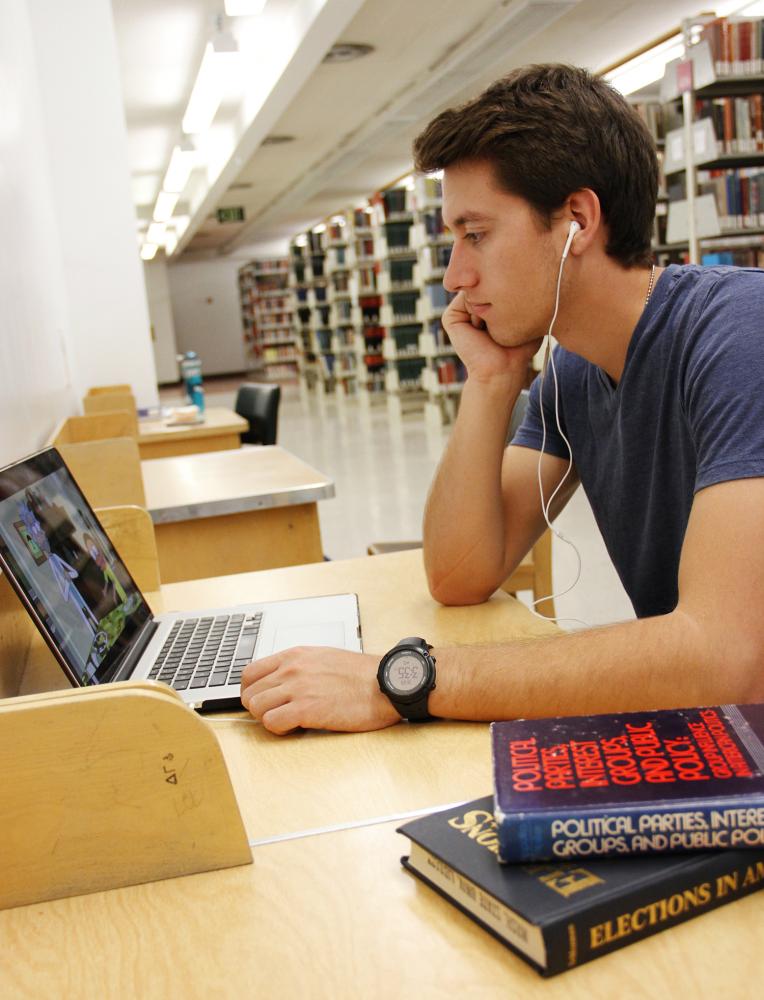Political discussion among students decreasing
Young people are afraid of discussing controversial topics with peers
JESSICA HARJA | Evergreen photo illustration
Students are more likely to discuss a show they watched the night before than they are to discuss important political issues.
September 27, 2017
A university is supposed to be a place that challenges one’s opinions, but it has turned into a place of social desirability, and young people have become disconnected with political discussion. University students need to engage more in political discussions and take initiative in what affects their future and lives.
In the early 1960s, President John F. Kennedy inspired a whole generation to question authority and to be expressive and vocal about what affects them. Today, one can put the blame for young people’s broad lack of political interest on the political discourse surrounding the 2016 presidential election.
“Right now, it’s difficult to find a tone for rational discussions, especially after the 2016 presidential elections,” said Claudia Leeb, assistant professor of political theory.
Despite our constitutional right to speech and advocacy as well as WSU resources available to develop them, political discussions remain unpopular among most WSU students. In fact, such conversations make them feel uncomfortable.
Students tend to aspire toward their future career, enjoy the best of their social lives and consume media, but hardly ever participate in political advocacy or activities.
“Cynicism is probably a big part of it,” said Nathaniel Nicol, a clinical associate professor in philosophy. “I’m afraid there is also a fear of backlash.”
Peer pressure and social stigmas are powerful enough to push for Netflix, social media satire and casual conversations in campus common areas, but not serious political concerns or discussions. It’s become obvious that expressing one’s political opinions attracts attention in both positive and negative ways. In a typical circle of friends or acquaintances, that attention often creates tension.
Political conversations almost exclusively take place on campus is if they were pushed for through a rally or demonstration, and student mayhem has been the outcome.
“I think the most fruitful way to frame political and moral disagreements is in terms of foundational principles,” Nicol said. “For example, I think the best way to frame the issue of same-sex marriage is in terms of the principle of equality. When seeing what’s at stake is clear, we will be in a better position to uncover our basic agreement beneath our superficial disputes.”
Despite the foundational principles being the sources of common morality in any society, the current political atmosphere replaced them with political indifference. The negative partisanship in current American politics between both the Democratic and Republican parties discourage students from engaging in arguments.
In addition to political indifference, students believe debates and discussions to be ineffective. Most do not have the optimism or enthusiasm to push for change of any kind.
“I think the best way to get people interested in politics is to show them how it affects their day-to-day life,” said Michael Salamone, assistant professor of political science. “The decisions made on a federal and state level impact people’s lives. I think making that connection to people will result in them talking about these issues more.”
To see real change, one must start from the bottom and inspire others. If ineffectiveness is a concern, start an organization on campus that promotes your ideas. All you’ll need is four initial members, an academic adviser and WSU Student Involvement approval. From there, you can lobby for what you’re passionate about on behalf of WSU and coordinate further collaborations with other student organizations like ASWSU.
On a personal level, many have a moderate and reasonable stance on controversial topics. Using that moderation to unite students rather than divide them can be a great start to improving the atmosphere on campus.









